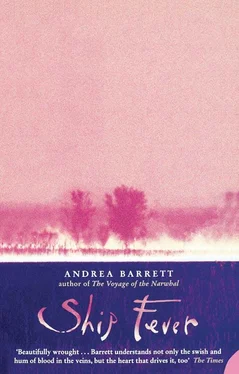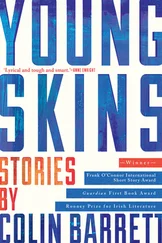They’d argued before about Lauchlin’s unwillingness to continue working at the immigrant hospital supported by Susannah’s aunt and uncle. “You’re as prejudiced as your father,” Susannah had said. In Findlay Grant’s eyes, the cholera that had killed his wife in 1832 had come from the Irish immigrants, and since then he’d never had a kind word for anyone or anything Irish. But Lauchlin’s defection had nothing to do with his father, only with the limits his own research placed on his time. He studied the nature and uses of alkaloids, those active principles isolated from plants. A substance as useful as atropine or quinine might reveal itself to him, if he were diligent. He’d thought Susannah understood the importance of this. She’d seemed to agree when he explained, after his second hospital visit, how he wasn’t really needed there, and how the work disrupted his research.
Now she offered him a biscuit and said, “Of course your own practice keeps you so busy — how is your practice?”
“The same,” he said bitterly. “As you know.” Why was she being so hard on him? His practice was the least part of his professional life, and the part in which he’d most obviously failed. “Hypochondriacs, asthmatics, rheumatics. And few enough of those. If Dr. Perrault had ever told me that a man with my training would have such a hard time finding patients…”
“Perhaps you ought to pay attention to that,” she said. “Perhaps you ought to think about other ways to employ your talents.”
Why were they arguing? All the warmth of their moment over the jewel-box had dissolved into this disagreement, which had surfaced several times since Arthur Adam’s departure. Where Lauchlin had always believed that his dedication to science would serve the world in large ways, Susannah believed in more immediate good works, embracing the recent flood of immigrants as if by doing so she might bring her parents back. During their honeymoon, she and Arthur Adam had investigated the slums of Paris and Edinburgh, and Arthur Adam claimed she’d contributed to his articles. Since he’d left for Ireland, she’d been helping her aunt and uncle gather food and bedding for the sick. But it was not as if Lauchlin had been idle.
“You’ve made your point,” Lauchlin said. “I notice you don’t seem to mind living in this fine house, though. Even if you’re too good to wear a necklace.”
Immediately he was ashamed of himself; she had lost both parents, where he had lost only one. And the oil portraits in their gilt frames, the piano, and the table with the claw-feet grasping marble spheres were not her choice. Once, when the three of them had been playing whist with another of Arthur Adam’s friends, the friend had complimented Susannah on the new Turkey carpet and she had said, “Arthur Adam picks out everything — congratulate him. ” A silence had fallen across the card-table, but later she and Arthur Adam had stood arm in arm at the front door, waving good-bye to the two single men.
“I’m sorry,” Lauchlin said. “I know you wish I was more like your admirable husband.”
He’d meant to be sarcastic, but to his horror she didn’t disagree. “So do something,” she said. Her handsome hand, flicking the air in a furious gesture, knocked her cup to the floor.
And at that, so discouraged and disheartened was he by both her attitude and Arthur Adam’s letter — Arthur Adam, brave and noble, off doing all that he ought to be doing himself — that he set down his own cup and left, his jacket tossed over his arm and the afternoon completely spoiled.
Annie Taggert watched Lauchlin leave. She had overheard most of this conversation; she had also, as Susannah suspected, listened to him read Arthur Adam’s letter. But the letter didn’t keep her from wishing the emigrants arriving here would all stay home. They were like Sissy, she thought. She bustled back into the sitting room and swept up the fragments of broken china while her mistress stared out the window. Too pathetic to help themselves, more and more of them flooding this country: like Sissy, whom Mrs. Heagerty had hired last fall in a moment of weakness. Filthy and stupid and good for nothing. Making a mockery of the people already here.
Down the stairs she went to the kitchen, balancing the heavy tray and already anticipating all that Sissy would have done wrong in her absence. Annie had left Ireland almost twenty years ago; she remembered her fellow passengers as poor but respectable. Men who found work immediately, on the docks or in the forest, cutting timber. Women like her, who went into service with a knowledge of what it meant to do their part in keeping up a household. Nothing like the new arrivals. She noted a small puff of slut’s wool on the stairs; Sissy, again. And in the kitchen she found Sissy crying as she peeled parsnips.
“What’s with her?” Annie asked Mrs. Heagerty, the cook. “What’s the girl sniffing about now?”
Mrs. Heagerty was filling and trimming the lamps, which marched across the table in tidy rows. The room was fragrant with the pies cooling on the range. “I went across to see Mrs. Mullaney,” Mrs. Heagerty said. “Just for a minute, you understand. And what do I find when I come back? Our lazy girl here, sleeping under the table like a dog.”
“What can you expect?” Annie said. She and Mrs. Heagerty had an old and firm bond; they had both worked for Arthur Adam’s parents for years, in one of the finest houses in the city, before coming here to set up this new household. They knew how things should be done. “The stairs are a horror, you know. You saw the filth she left in the corners?”
“No,” Mrs. Heagerty said. “Really?” They turned to weeping Sissy and shook their heads. Annie piled the crockery near the sink. “Don’t you be smashing these when you wash them,” she warned Sissy. “Mrs. Rowley’s already done enough damage for one afternoon — and the good china, too.” She turned to Mrs. Heagerty. “Swept a cup right to the floor, she did. She was that angry at the doctor.”
“What was he wanting?” Mrs. Heagerty asked.
“He had a letter,” Annie said. “From Mr. Rowley. I heard him read part of it. Terrible goings-on over there. If you could hear the things he writes — a stone would cry.”
“ He’ll cry,” Mrs. Heagerty said darkly. “When he gets home. If someone doesn’t have a word with that wife of his.”
“They had a fight,” Annie said. “I think that’ll be the end of our doctor — you should have heard the tone in her voice.”
“He’s a useless creature, isn’t he? I heard from Mrs. Mullaney that whole days go by when he isn’t called to a decent house.”
Annie agreed, although she was not sure what it was she wanted the doctor to do. No one could emulate Arthur Adam Rowley, and the idea of the doctor joining in Mrs. Rowley’s dogooding was hardly better. Annie disapproved of her mistress’s actions almost entirely. Exposing herself to filth like that, walking through low parts of town with only a Quaker woman for a chaperone — no, it was not appropriate. Although it was just what you might expect from a woman brought up so irregularly. Mr. Rowley’s mother would never have done such a thing.
Sissy sniffed. “I heard,” she said, in a quavery voice just audible to Annie.
“You heard what?” Annie said sharply. “Speak up.”
“I heard,” Sissy repeated, “from Margaret — you know, at the Richardsons’—that a patient of his died because of something he did. Mrs. Sewell, it was. She had the dropsy. And Dr. Grant wouldn’t bleed her, Margaret says. She says Mrs. Sewell swolled up like a great pig and died, because Dr. Grant wouldn’t bleed her.”
“You heard, ” Annie said angrily. “You heard. You know better than to repeat that sort of gossip.” But to Mrs. Heagerty she said, “What can you expect of a man like that? Learning here isn’t good enough for him, he has to go to Paris, France. Then he’s surprised when he comes back here with his fancy theories and finds no one to welcome him but our generous Mr. Rowley.”
Читать дальше
Конец ознакомительного отрывка
Купить книгу












